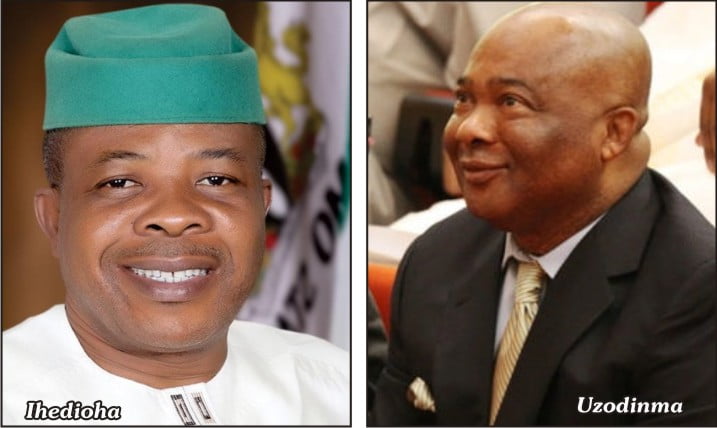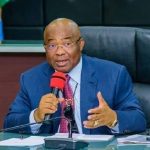A coalition of leaders of conscience in the country, under the aegis of the Third Force Movement in Nigeria has vowed to drag the Supreme Court of Nigeria to the United Nations, UN, United States of America, United Kingdom, African Union, European Union among others, over its refusal to review the judgment that sacked Emeka Ihedioha of the Peoples Democratic Party, PDP, as the Imo State Governor.
The coalition faulted the court, saying its decision has cast serious doubt over the integrity and sanctity of the Nigerian Judiciary.
This was contained in a statement issued on Tuesday night, hours after the court’s ruling and signed by their Spokesperson, Dr. Olusegun Obe.
The Coalition said the Court’s decision “thereby violated the Spirit and Principle of Justice, which is the whole essence of the necessity for the Judiciary and so may heighten the political tension in Imo State and the south east at large.”
The group disclosed that all was now set to internationalise the matter, adding that it was sending a formidable petition to the UN, US, UK, AU, EU, among other world powers.
According to the group, this is in pursuit of the course of justice on the controversial judgement, “which we regard as a ruthless attempt to sweep fraud and injustice under the carpet.”
The Third Force added, “We are therefore resolved more than before to be steadfast and resolute as concerned Leaders’ of Conscience in Nigeria to pursue this cause of Justice to its logical end over this worrisome precedence by the Supreme Court, which has since foisted a dark cloud over the survival of Nigerian democracy and the peace and stability of the South East.
“Accordingly, we plan to further engage and rally National leaders of conscience like Nobel Laureate, Prof Wole Soyinka, Prof Ben Nwabueze, SAN, Chief Emeka Anyaoku, Alhaji Balarabe Musa, Admiral Ndubuisi Kanu, Chief Ayo Adebanjo, Bishop Mathew Kukah, Dr Kalu Idika Kalu, Solomon Asemota, SAN, Prof Pat Utomi, Dr Olisa Agbakoba, SAN, Mr Femi Falana, SAN, Comrade Shehu Sanni, Chief Mike Ozekhome, SAN, Dr Obby Ezekwesili, Former Presidents and Heads of State, the leadership of the Nigerian Bar Association, NBA and the International Community, among others, to help monitor development concerning this historical matter.”
The group in an earlier statement had quoted late Justice Chukwudifu Oputa as regards the powers of Supreme Court to review or reverse its earlier decision.
It said while delivering the lead judgment in Adegoke Motors Ltd. v. Adesanya (1989] 13 NWLR (Pt.109) 250 at page 275A, Justice Oputa, also known as the “Socrates” of the Supreme Court, considered the powers of the Supreme Court (as the final Court in the land) to review its earlier decisions and said inter alia: ‘We are final not because we are infallible, rather we are infallible because we are final’.
“Justices of this Court are human beings, capable of erring. It will certainly be short sighted arrogance not to accept this obvious truth. It is also true that this Court can do inestimable good through its wise decisions. Similarly, the Court can do incalculable harm through its mistakes.
“When therefore it appears to learned counsel that any decision of this Court has been given per incuriam, such counsel should have the boldness and courage to ask that such a decision be over-ruled. This Court has the power to over-rule itself (and has done so in the past) for it gladly accepts that it is far better to admit an error than to persevere in error.”
It continued, “We also make bold to state that the application before the Supreme Court is not an appeal but a review which the Supreme Court in previous instance have claimed jurisdiction over, so as to correct errors of misinterpretation or fraud in Judgement previously given in error.
“So, we wish to remind their Lordships of Oriker Jev & Ors. v. Iyortom & Ors. [2015] NWLR (Pt. 1483) 484, where the Supreme Court had in an earlier ruling mistakenly ordered that INEC conduct rerun election, but upon application for review, the court discovered it gave the said order based on a wrong interpretation of Section 133(2) in conjunction with Section 141 of the Electoral Act 2010 (as amended) and subsequently set aside the earlier ruling and ordered INEC to issue the applicant a certificate of return.
“Furthermore, there is also a precedence of review in the case of Olorunfemi v. Asho [2000] 2 NWLR (Pt. 643) 143. The Supreme Court in its 18th March, 1999 ruling set aside its earlier judgment delivered on the 8th January, 1999 and ordered that the appeal be heard de-novo by another panel, on the ground that it ought to have considered the Respondent’s cross-appeal first before allowing the Appellant’s appeal.
“These are examples of where the Supreme Court has previously set aside its earlier rulings, which are not by reasons typographical errors but misinterpretation and administration of justice by errors as evident in the Imo ruling, which gave mandate to Uzodinma who was never a candidate of any political party with votes not in tandem with total accredited voters.
“Therefore the of the Constitutional finality of the Judgement of the Supreme Court, where, its flows from or rest on fraud and misleading evidences can never serve the purpose of justice for which the Constitution created the Supreme Court and therefore defeats the whole essence of the Judiciary.”
DAILY POST





